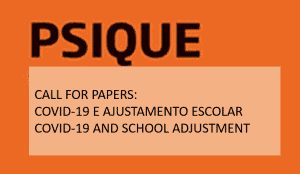The Psychology Research Center of the Psychology Department of the Universidade Autónoma de Lisboa is committed to respecting the privacy of its users.
The User, when sending information through the website of the Center for Research in Psychology of the Department of Psychology of the Universidade Autónoma de Lisboa, declares and guarantees that he has the powers and capacity to do so.
IDENTIFICATION OF THE RESPONSIBLE FOR DATA PROCESSING
- University Teaching Cooperative founding entity of the Autonomous University of Lisbon
- Rua de Santa Marta 47 2º 1150-293 Lisbon
- privacidade@grupoautonoma.pt
DATA COLLECTED
The Psychology Research Center of the Psychology Department of the Universidade Autónoma de Lisboa, through Google Analytics, collects the following aggregated data: Geographic origin (city, country), language, device type, operating system, browser, operator, access date and time, referencing data addresses, IP address.
The Psychology Research Center of the Psychology Department of the Universidade Autónoma de Lisboa will monitor all the statistical information related to the use of the site in an aggregated and anonymous way. The data used for this purpose does not contain personally identifiable data or private information.
The analyzes carried out from this information will be carried out to interpret the patterns of use of the website and improve service levels and user satisfaction. This information may be disclosed to third parties or publicly.
The Psychology Research Center of the Psychology Department of the Universidade Autónoma de Lisboa also uses cookies on the website in order to improve the performance and user experience.
“Cookies” are small text files that are stored on your computer or mobile device through your browser, retaining only generic information related to user preferences; allow access to specific areas of the site and faster and more efficient navigation, eliminating the need to repeatedly enter the same information.
By clicking on the cookies banner or by continuing to browse the website of the Center for Research in Psychology of the Department of Psychology of the Universidade Autónoma de Lisboa, users of the website are accepting the insertion of cookies in the respective devices mentioned above, without prejudice to the control and management available.
Through browsers, any user can accept, refuse or delete cookies, namely by selecting the appropriate settings in the respective browser. At any time, the user can, through it, decide to be notified of the receipt of cookies, as well as block their entry into their system. Removing or blocking cookies on the website may limit access to some areas of the website.
The Psychology Research Center of the Psychology Department of the Universidade Autónoma de Lisboa may also use web beacons (including conversion pixels) or other technologies for purposes similar to those identified above, including them on its website, in marketing emails or in our Newsletters. to determine if messages have been opened and links provided have been clicked. Web beacons do not place information on users' computers, but they can, in conjunction with cookies, allow the monitoring of website activity. Conversion pixels are small codes located on a web page that are activated when someone visits that page.
WHAT WE DO WITH YOUR DATA (PURPOSES)
Publication on the website cip.autonoma.pt of the following personal data of the Researchers: Name, Category, Photograph, Biographical Note, DeGóis Link (if you have not migrated to CIÊNCIAVITAE. Source accessible to the public), Link CIÊNCIAVITAE (source accessible to the public), Link ORCID (publicly accessible source), Email.
LEGAL FOUNDATION
Consent.
HOW LONG DO WE STORE YOUR DATA
They will be kept as long as the Data Subject does not withdraw his Consent.
TRANSFERS TO THIRD COUNTRIES
There are no data transfers to third countries.
DATA PROCESSING
They will not be subject to treatment for automated individual decisions, nor for profiling.
MEASURES IMPLEMENTED TO PROTECT YOUR DATA AGAINST UNAUTHORIZED ACCESS, ALTERATION OR DESTRUCTION
The Psychology Research Center of the Psychology Department of the Universidade Autónoma de Lisboa takes the necessary and legally required precautions to guarantee the protection of the information collected from its researchers and users.
The watermark will be placed on the photo.
Among others, the following technical and organizational measures are implemented to guarantee the security and confidentiality of personal data: physical security (through access control), logical separation of records, passwords access and access levels, firewalls and antivirus programs.
YOUR RIGHTS
All personal data are processed in accordance with the provisions of Regulation EU 2016/679 of the European Parliament and of the Council, with the holders of personal data having the right to access, freely and without restrictions, confirming, rectifying, erasing or blocking the data. that they have provided, as well as the right to portability and limitation of treatment with regard to the data subject, or the right to oppose the treatment, being able to exercise it in writing, in person at our facilities or via email. privacidade@grupoautonoma.pt, at any time and free of charge.
The Data Subject has the right to withdraw his consent at any time, being able to exercise it in writing, in person at our facilities or via email. privacidade@grupoautonoma.pt.
The Data Subject has the right to file a complaint with the National Data Protection Commission or any other supervisory authority.



